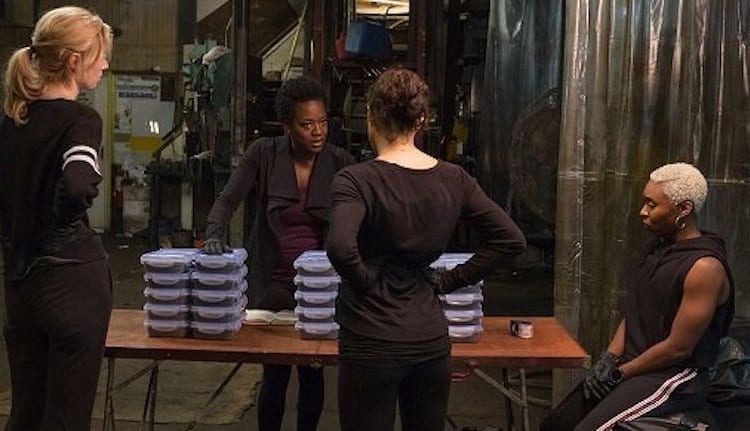
Don’t get mad, get even;” pearls of wisdom most boys will hear at some point on their journey to becoming men. Girls, not so much. They aren’t taught to turn their anger into power, courage or revenge. Girls are told to tuck it neatly out of sight lest it should offend. Even as feminism’s tide has risen, making it acceptable, desirable even, for women to speak out or attain success, we still have to curtsy while doing it. Look no further than Serena Williams’ excoriation after an outburst at the U.S. Open; something that would have earned her male counterparts a slap on the wrist, not a three-day news cycle. For our perceptions to shift in reality, they must shift in the stories we tell. Yet, in movies, female anger is more often than not diminished as hysteria, whereas female power often has to rise to Wonder Woman-like perfection to be admired. In director Steve McQueen’s latest movie, Widows, he shows us that neither is necessary for women to command the screen or the imagination.Widows is a feature adaptation of Lynda La Plante’s ‘80s British TV series. It follows a group of women who are forced to become felons after their husbands are killed.
RELATED POSTS
Broadcast Signal Intrusion: Vulnerability, Fear, and Paranoia Through a TV Screen
Safer, Sleeker Consumption On the Go: The PAX Era Life Premium Vaporizer
“Here Before” Review: A Mother’s Grief Tests Reality
To call it a crime caper would be understating the movie’s depth. McQueen, best known for directing Shame and 12 Years a Slave (the latter for which he won an Oscar, the first black British producer-director to do so), has established a reputation for telling stories that include incisive explorations of racial dynamics and socio-politics. The film takes place in Chicago against the backdrop of a brutal local election in a city struggling with a bipolar identity. It’s a place where fancy apartments’ vistas survey hardscrabble streets and religion, race and class constantly butt up against each other. McQueen leaves no aspect of America’s angst untouched. Co-written by Gone Girl author Gillian Flynn, a writer best known for her dark, disturbing but above all formidable portraits of female drive and fury, Widows’ magnetic core continually delivers surprising revelations of the lives and motivations of the disparate women who come together to survive amidst the crossfire.
Widows’ strong ensemble cast is led by a quietly dazzling Viola Davis who plays Veronica, the teachers union delegate married to career criminal Harry Rawlings (Liam Neeson).
When Harry is killed in a botched job, saddling her with a massive debt, Veronica can no longer look the other way. And when hustler-turned-aspiring politician Jamal Manning and his bone-chillingly ruthless brother Jatemme (in brilliant performances from Brian Tyree Henry and Daniel Kaluuya) come to collect and make her life a living hell, Veronica turns rogue. The brothers put her on notice and the tension surges as Jamal is locked in a tight race with political heir apparent Jack Manning (Colin Farrell). Armed with nothing but his notebook, Veronica then enlists the widowed wives of the men killed with Harry to help her finish his last job.
It’s a motley crew finding their way in a world that’s left them with little to bank on. Michelle Rodriguez plays Linda, a mother who has lost her shop to her husband’s debts. Elizabeth Debicki is abused-wife Alice who now refuses to depend on anyone but herself and Cynthia Erivo is the south-side single mum who becomes the team’s hard-as-nails driver.
The film might feel like the female heist movie that a post #MeToo world is clamoring for, but instead busts all the clichés that this suggests.
Outstanding peripheral character portraits and a nuanced socio-political framework lend the film layers and substance that have eluded female-led action thrillers like Ocean’s 8. McQueen and Flynn do the most to topple tropes when it comes to the women themselves. To drive the story forward, these characters do not lean on their femininity in conventional ways. In spite of the fact that each one has been taken advantage of by their deceased husbands, none of them need to be saved, indulged, avenged or propped up. These women (and the fact that they are women isn’t lost at all as childcare is strategized in the same breath as safe house raiding) turn their grief and rage into strength as we see consistently see men do on screen, effectively, ruthlessly and gracefully.
If femininity is not a crutch in Widows, it’s not a trophy either.
These Widows are far from angels. It suits Veronica just fine to turn askance from Harry’s life of crime. Elizabeth opts to be a paid escort in an exclusive relationship with a wealthy real-estate developer and has no qualms about her survival tactics. Belle and Linda aren’t weighing the moral implications of their criminal choices for their kids.
These women, in atypical roles for female protagonists, are admirable yet far from perfect as they plot, loot, and murder. They do not feel the need to make excuses for their actions and refuse to be judged by us or by each other. In creating women that are morally ambiguous while being unambiguously heroic, enraged yet not insane, writer and director have leveled a gender-discordant playing field. By making a film that is a taut, brilliantly-acted heist, where a female cast is simple fact, not a constraining factor, and female anger is power, not plague, McQueen has refuted conventions of the female empowerment film and made his most empowering film yet.–
Widows releases nationwide November 16th. For more information, visit foxmovies.com/movies/widows or follow on Facebook, Twitter, and Instagram.–


